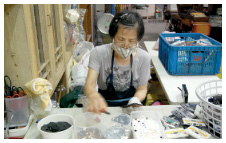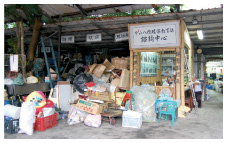Cutting waste at the source
Updated: 2011-02-22 07:04
By Kane Wu(HK Edition)
|
|||||||||
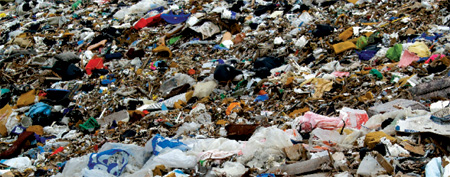
|
A woman recycles cassettes at a workshop in Taipei. Compared with Hong Kong , recycling in Taipei is done in a more meticulous way. Fu Lei / China Daily |
|
A waste recycling and educational center in Taipei. The city boasts a well managed waste recycling system while the citizens have high awareness of environmental protection. Fu Lei / China Daily |
As Hong Kong continues to grapple with its waste disposal problems, greater emphasis is falling on the need to separate waste to be recycled. Kane Wu reports.
Sales season can be heaven and hell for Lisa Xu, a 25-year-old office clerk who has lived in Hong Kong for almost three years. "I always find myself spending too much and when I get back home. Oh dear, the wardrobe is just too little," Xu whines.
Then Xu starts the seasonal cleaning of her two wardrobes, standing side by side in her no-more-than-five-square-meter bedroom. After hours of sweating, the next question for her is: how to deal with the old and discarded clothes?
Xu rents a small room in a 40-year-old apartment building in Sai Wan, the western part of Hong Kong Island. The 10-story building has one rubbish bin on each floor. "Basically we just wrap up all kinds of rubbish in a bag, and throw it into the bin," Xu says. "I don't want to mix clothes with food residue and other dirty stuff. They are still wearable, but where can they go?"
Domestic waste in Hong Kong goes to the waste transfer stations first before being dumped in landfills. En route to the station, scavengers come and pick up cupboard, paper or plastic bags that can be sold for recycling. Then they sell them to private collectors who hand the waste over to packaging companies before the waste is exported.
Hong Kong people produce about 18,000 tons of municipal solid waste every day, of which about 9,000 tons end up in three landfills in the city. The landfills will reach their capacities, expiring one by one from 2014 onwards. Landfill expansion and the construction of incinerators are questions that remain up in the air, while waste overflow becomes ever more imminent. Thus, the recycling business, if enhanced, can help solve the current waste problem to a great extent.
The government has claimed that over 80 percent of the Hong Kong population is covered by recycling facilities. According to the Environment Protection Department, recyclables that cover all types of waste paper, metals and plastics are collected through the three-colored waste separation bins placed in housing estates and commercial/industrial buildings - blue for waste papers, yellow for metals and brown for plastics. Some estates/buildings also collect other types of recyclables such as used computers and electrical appliances, clothes, batteries, printing cartridges and so on. Unfortunately, the building Xu lives in is not one of them.
Even in buildings equipped with those facilities, residents still find it difficult to recycle. "Residents make an effort to separate the waste, but at the end of the day, different bags all end up in the same waste carrier truck," Choy So-yuk, Eastern District Council member and environmentalist, complains to Secretary for Environment Edward Yau at a seminar on environmental protection on Jan 26. The seminar invites recycling experts and members from the industry to discuss Hong Kong's waste management together with Yau.
"Over a dozen buildings on Pokfulam Road set up the three-colored bins, but nobody came to collect the separated waste because there is so little value in it, so how can the citizens be motivated to recycle?" Choy questions.
"Waste paper, aluminum cans and old clothes are more valuable than other waste, thus more people collect them," Michelle Au, senior environmental affairs officer of Friends of the Earth, an NGO dedicated to environmental protection, tells China Daily. "Those of lower value, even though recyclable, usually go to the landfills."
"The industry is all about the price," Lo Yiu-chun, chairman of the Hong Kong General Association of Recycling Business and owner of On Kee (HK) Environment Recycling Ltd, says.
Lo's company has won many environmental awards in Hong Kong and even Asia for their "comprehensive recycling" business model. They cooperate with estates, commercial buildings, restaurants and schools to recycle unprofitable items such as glasses, wooden boards and plastic meal boxes, while most recycling companies in Hong Kong only deals with one kind of waste. "We are actually losing money on these things, but we have to do this. It is environmental protection," Lo says.
Luckily the company manages to cover its loss from those profitable items to this day.
"If we rely on the market needs only, there is no way to make recycling a sustainable business," Au comments.
"The government needs to change its mindset on waste management. Even though they have been talking about cutting waste from its source for a long time, their policy still focuses more on how to deal with the waste when they are dumped in the landfills," says Au.
Richard Cheung, associate professor at the Department of Biology and Chemistry at the City University of Hong Kong, shares the same view.
"The government should subsidize the recycling business, otherwise the waste will just go to the landfills because nobody has the incentive (to recycle)," he says.
"Now the government spends a lot of effort on education (for the public), but if they do not develop the correct strategy and the determination of the strategy, there will be just empty talk," he adds.
Cheung has been to Taipei several times to research local waste management there. He is impressed by its "domestic waste never touches the ground" policy.
"Only two exceptions: it touches the ground in a bag that you have paid already; or you get a penalty ticket," Cheung explains.
Taipei citizens have to pay to get waste bags from the government, separate different waste into different collect bags and then throw them into the designated government waste collecting trucks. The payment varies in proportion to the size of the bags.
"In Hong Kong, you can throw away anything anywhere, there will be no charge. In Taiwan, it is illegal to throw away things without paying. This is what we call polluter principle," Cheung says. "The more you throw away, the more you should pay."
The Hong Kong government is actually considering the approach. It plans to charge extra municipal solid waste that citizens fail to take to recycling bins. At the same time, the number of public rubbish bins will be reduced so that citizens won't be able to dump domestic waste into public bins. A public consultation will be held in the second half of this year to determine whether this approach can be put into practice.
Currently 49 percent of the waste in Hong Kong is recycled.
"We are going to raise the reduction rate to 55 percent by 2015," Edward Yau says at the seminar. "But waste reduction involves the public, the industry and the government. It's impossible to rely on one single side. We need to reach a balance."
While the government and the industry seem to be making efforts, the consumer attitude of people in Hong Kong, on the other hand, remains yet another cause for the waste problem.
In a survey by Friends of the Earth, 40 percent of people take clothes that they have never worn to the recycling stations. "The biggest problem for Hong Kong is that people take it for granted that recycling means environment protection," Au says. "They keep shopping for new things and throwing old things away. They just love the convenience."
Cheung observes the environmental burden imposed by consumerism, saying "we just keep changing things because we have money. Young people don't care how much they spend."
Au notices the gap between awareness and action, saying, "for the lower class, waste recycling means extra income. For the middle class, they know its importance, but they don't act accordingly."
Perhaps it's time for Hong Kong people to behave.
Lisa Xu says one of her new year resolutions is to shop selectively. "I will only buy clothes that I need from now on. I will try to achieve that goal," she says.
And she also found a solution to the clothes that can't fit into her closet: she gave them to the cleaning ladies in her company. "They picked some for themselves and will probably sell the rest to the recycling companies," Xu says. "Everybody is happy."
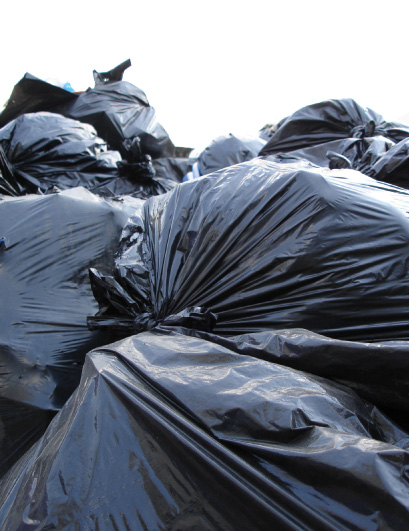
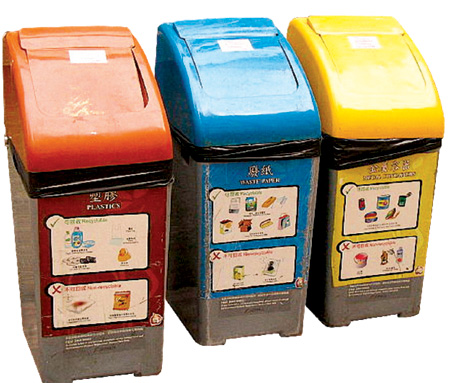
(HK Edition 02/22/2011 page4)
